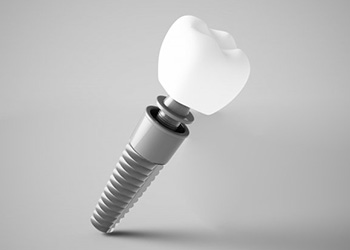Dental Implants – Winfield, KS
The New Standard
of Tooth Replacement
Dentists have been using dental bridges and dentures to replace teeth for a very long time, but now there’s a better solution. Using biocompatible materials like titanium, Dr. Parsons can replace the entire structure of a missing tooth, not just the crown. By taking this additional step, you can give yourself a tooth replacement that truly withstands the test of time and feels natural along the way. To learn more about dental implants from our Winfield, KS dentist or schedule a consultation, give us a call!
Why Choose David C. Parsons DDS for Dental Implants?
- Placement and Dental Restoration Completed In-House
- CT Cone Beam Scanning Technology for Better Planning
- Affordable Financing Options and Transparent Fees
What are Dental Implants?

Dental implants are made up of three essential components that work to replace teeth. This includes the titanium post (which sits beneath the gum line) a dedicated restoration, and an abutment which attaches them together. While more implants may be needed, they can be used to hold either a crown, bridge, or denture, making them extremely versatile. Additionally, because they are the only option that replaces the root, you can expect true longevity, functionality, and outstanding esthetics that you won’t find with other tooth replacements. This is why dentists like Dr. Parsons often recommend them to patients who are eligible.
The 4-Step Dental Implant Process

The treatment for dental implants is broken down into four phases. This includes the consultation, the surgery, the healing phase, and the final placement of the restoration. We handle everything in-house, which means you can keep working with a team you trust. At every stage of the process, Dr. Parsons and the rest of our team can answer your questions, guide you through necessary steps, and let you know what to expect next. Contact us if you’re ready to learn more about it or get started.
Initial Dental Implant Consultation

Although no treatment is performed during this first appointment, it plays an essential role for future phases. At this visit, Dr. Parsons will thoroughly examine your mouth, take a CT scan of your oral cavity, ask about your medical history, and put together a customized treatment plan. He needs to make sure your mouth is in optimal condition for implants and make sure you have a high chance of success. Plus, making a plan in advance will reduce complications during and after the surgery. If necessary, we may perform gum disease treatment or extraction to prepare for the placement procedure.
Dental Implant Surgery

After we’ve confirmed your eligibility to receive implants during your consultation, we’ll schedule you for surgery, which typically occurs at a later date. During the surgery, a small incision is created in your gum tissue so that a tiny hole can be formed. This is where the implant will sit and begin integrating with your bone and soft tissue.
Instead of sending you to another practice, Dr. Parsons and our team are highly trained and perform this procedure in our office for your convenience.
Dental Implant Osseointegration & Abutment

From there, we’ll need to wait about four to six months for the implant to heal. During this time, the jawbone produces new growth and surrounds the implant, giving it stability and strength. Then, when this process called osseointegration is finished, a piece called an abutment can be placed. This connector joins the final restoration to the implant.
Delivery of Dental Implant Restoration(s)

To make your restoration, we’ll need to take impressions of your upper and lower arches. Our lab uses this information to fabricate your implant-retained crown, bridge, or denture according to your needs. Finally, the finished product will be bonded to your implants, completing your smile and giving you the next best thing to getting your natural teeth back!
Benefits of Dental Implants

Dental implants are known as the “ultimate tooth replacements” for good reason. In reality, they’re so effective that dentists place 500,000 of them yearly. The posts’ unique placement method ensures they can reach such quality. Given its presence, dental implants come with perks that other restorations can’t match. As for what these exact upsides are? Well, just read below to learn the benefits of dental implants in Winfield. Otherwise, feel free to call us for the details.
Day-to-Day Benefits

Soon after treatment, you’ll likely be struck by dental implants’ day-to-day benefits. These include:
- A Gorgeous Grin – Dental implants are capped with porcelain, so they blend seamlessly with your smile. You can trust them to match your other teeth in color, size, and shape. The result is a beautiful and lifelike grin.
- More Confidence – By restoring your smile, dental implants can boost your confidence. They will likely help you feel calmer and self-assured, even as you mingle with friends and family.
- Easy Eating – Dental implants restore your bite force when they fuse with your jaw. As a result, they’ll let you eat your favorite tough foods again.
- Simple Upkeep – Dental implants are easier to clean than dentures and dental bridges. All you need to do is care for them like natural teeth. In other words, brush them twice daily, floss between them once daily, and rinse them with mouthwash.
Health Benefits

Of course, dental implants don’t just have everyday perks; they also have many health-related ones. Notable upsides in this second category are:
- Good Nutrition – Since they let you eat tougher foods, dental implants expand your dietary options. This wider range of meal choices boosts your nutritional health.
- Better Oral Health – Harmful bacteria breed in the gaps left by missing teeth. Tooth loss thus raises your risk of tooth decay and gum disease. Still, dental implants can fill the gaps to improve your oral health.
- A Strong Jaw – Tooth loss erodes your jaw when it isn’t corrected quickly. From there, you can suffer a facial collapse. Luckily, dental implants prevent and reverse this erosion. They’ll stimulate your jawbone to ensure it stays full and robust.
- Intact Dental Structures – Other teeth don’t need to be altered to place an implant. So, treatment tends to preserve your natural tooth structure.
Long-term Benefits

Lastly, you should know that implants have great long-term benefits. These are:
- Long-Term Success – Dental implants usually succeed over long periods. In fact, their 10-year success rate is 98%!
- Lasting Results – An average dental implant has a lifespan of 15-20 years. Meanwhile, a well-maintained one can last for 30 years or more. Either way, treatment results can potentially cover a lifetime.
- High Financial Savings – In the long run, dental implants will save you money. Their long lifespans ensure they rarely need repairs or replacements. For that reason, they won’t require little follow-up work compared to dentures or dental bridges.
Who Can Dental Implants Help?

Dental implants are ideal for many patients who are missing teeth, but there are still some important qualifications you should meet before receiving them. For example, it’s a given that your oral health needs to be in good condition. However, you will also need healthy gum tissue and sufficient bone volume specifically to receive dental implants. This ensures they heal properly once they have been placed. With this in mind, dental implants are capable of replacing any number of teeth.
Missing Single Tooth

To replace one tooth, a dental implant is placed into the jaw and a dedicated crown is attached via an abutment. The titanium post is strong enough to hold a restoration (which is made from lifelike dental ceramics), designed to blend in with neighboring teeth, and last for decades.
Missing Multiple Teeth

Using either a single or pair of dental implants, a bridge can be specifically designed to attach to them and fill a large gap in your smile. The implants do all of the heavy lifting, which means you won’t need to have nearby teeth modified to accommodate it.
Missing All Teeth

If you’re missing an entire arch of teeth, dental implants can be strategically placed in order to hold a more complex denture. That means there’s no need to worry about a constantly shifting denture when eating, speaking, or smiling.
Understanding the Cost of Dental Implants

Due to the high level of personalization that comes with dental implants, the cost of different treatments can fluctuate significantly. For example, if you need to have preparatory treatments to be eligible for the procedure or if you need more than one tooth replaced, the cost will increase. Regardless of the final price tag, you can always expect our dental office to be transparent about fees and help you plan your finances to make care affordable.
Preliminary Treatments & Dental Implant Surgery

You may need to receive preliminary treatments like gum disease therapy, tooth extractions, or bone grafting before you can receive dental implants, and the costs associated with these procedures will be represented when you are billed. While it is not possible to place dental implants without treatments like these in many cases, they may receive at least partial dental insurance coverage.
The placement surgery involves a separate cost determined by factors such as where the appliance is to be positioned in the jaw and the type of sedation and anesthetic treatments used. Since we place dental implants in-house at our Winfield office, you won’t have to worry about dealing with a separate specialist who uses a different pricing structure.
The Parts of Your Dental Implant

The cost of the parts used to create your dental implants and the number being placed will also play significant roles in determining their final price. Depending on where the implant is being placed, it may require a longer or shorter titanium post, and longer posts are generally more expensive. The type of restoration being mounted on the implant will also influence the cost since larger restorations like dentures or bridges are more expensive than smaller ones. However, using several implants to replace an entire arch with an implant denture can be much more cost-effective than restoring each tooth individually. If you’d like to learn more about who manufactures our dental implants and brand-related costs and benefits, feel free to ask our staff.
How Dental Implants Can Save You Money

While dental implants may seem like a huge investment, they offer a range of benefits that can make them much more cost-effective than traditional restorations. While dentures and dental bridges may seem cheaper than implants at first glance, these appliances only last for about ten years if they receive excellent care, meaning they will eventually need to be replaced. Dental implants, on the other hand, can last for several decades or even a lifetime if they are properly cared for, meaning that patients can potentially save thousands of dollars over the years by not having to buy expensive replacement restorations. Dental implants are also easy to keep clean and help preserve the health of the jaw, which can prevent costly oral health issues later.
Does My Dental Insurance Cover Dental Implants?

Dental insurance doesn’t usually cover dental implants, but our team will be happy to help you go over your plan and maximize your benefits. We are in-network with many providers, and, in many cases, insurance at least partially covers preliminary restorative treatments like gum disease therapy.
Making Dental Implants Affordable

We partner with CareCredit to provide flexible financing options to qualified patients. These payment plans break your bill into smaller monthly installments, and once you’re approved, you may qualify for our dental implant special that includes placement, the abutment, and the crown for $166 a month. During your consultation, our team will be happy to help you understand your payment and financing options so you can find the best way to make implants affordable for you.
Dental Implant FAQs

Dental implants in Winfield are a proven solution to permanently replace lost teeth. Although you’ve heard about their benefits, you might still have a few concerns. There isn’t any reason to worry. We’ll explain everything during your initial consultation. While you wait for your appointment, here are the answers to a few of the most common questions patients ask us about dental implants.
How long do dental implants last?
Traditional dental prosthetics only last for a few years before needing to be replaced, which can get costly over time. Dental implants are the most cost-effective treatment because they are proven to thrive for 30 years or longer with the right aftercare, like maintaining your oral hygiene at home. Several factors influence the longevity of dental implants, like your oral health and lifestyle. You can ensure your new smile lasts for decades by brushing at least twice a day, flossing nightly, and using an antimicrobial mouthrinse. It’s best to avoid any foods that are hard or sticky. Don’t forget to visit your dentist at least twice a year for a cleaning and checkup.
Can I take dental implants out?
Your implant post is surgically placed into your jaw. Your bone will fuse to it through a process called osseointegration, allowing it to stay in place forever with the right care. As a result, dental implants aren’t removable unless taken out by a dental professional. Some implant-supported dentures can be removed for cleaning, but the posts will stay securely in your mouth.
Does getting dental implants hurt?
You’ll need oral surgery to place your dental implants, but you won’t feel anything because an anesthetic will be used to keep you comfortable. Your implant dentist in Winfield will ensure you’re numb before getting started. It’s normal for your mouth to be a bit tender for a few days after your placement surgery, but you can manage it using an over-the-counter or prescribed pain reliever. A cold compress can also reduce pain, inflammation, and swelling. If your discomfort worsens after 3 days, contact our office. Once your mouth has healed, you shouldn’t have any pain. If discomfort or a feeling your implant is loose occurs after you’ve recovered, call our office right away. We’ll pinpoint the cause of your pain to prevent dental implant failure.
Are dental implants safe?
Patients who have good oral and general health can benefit from dental implants with minimal risk for complications. It’s best to choose a qualified implant dentist to perform your treatment. They’ll conduct a thorough consultation to ensure there aren’t any issues that might lead to dental implant failure. If they find any concerns, like bone loss or gum disease, they’ll be resolved first before moving forward with your placement surgery. Although dental implants are safe for most patients, certain medical conditions can increase the risk of problems, like diabetes or cancer. If you have a unique situation, we’ll take additional precautions to ensure your safety and the long-term success of your new smile.
